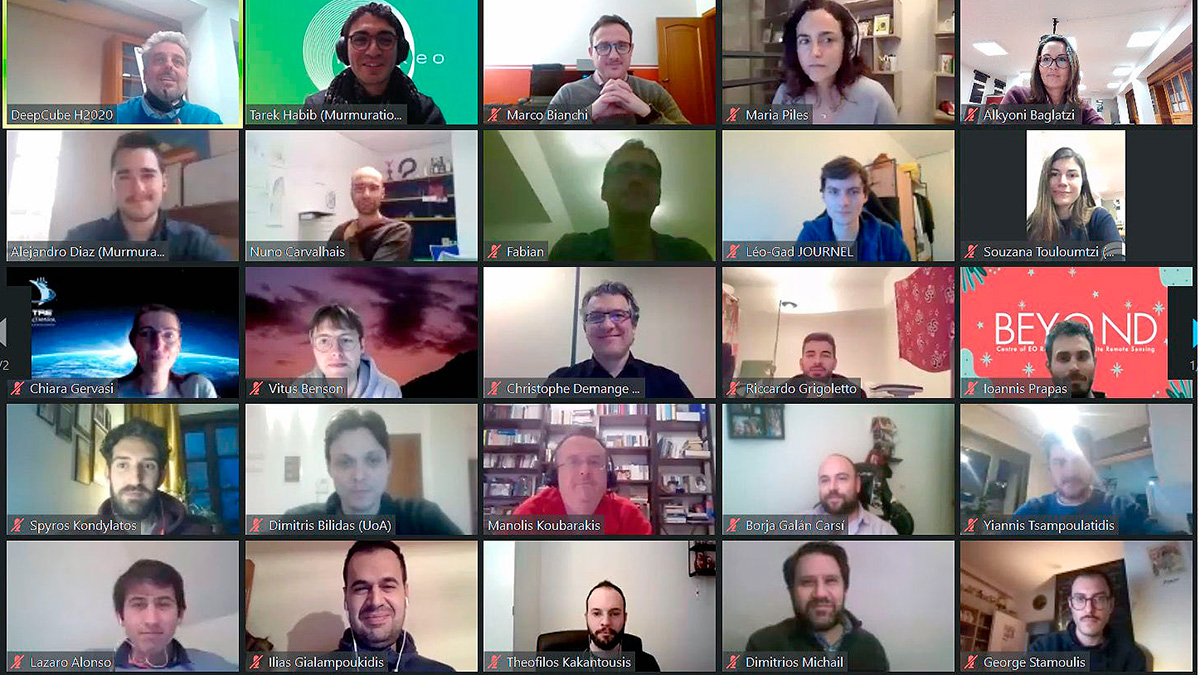Representatives of the DeepCube project (H2020-SPACE), among which is the University of Valencia, have held their first working meeting in order to initiate and coordinate activities necessary to meet their objectives: to address new problems with high environmental and social impact, improve understanding of the Earth’s processes correlated with Climate Change and generate business value. All of this through Artificial Intelligence (AI) and semantic data models.
The European Union’s Copernicus Earth Observation Program provides free and open, large-scale, high-quality data, a paradigm shift in Earth observation. Today, Copernicus produces several terabytes of data each day. However, the availability of its enormous volume of data exceeds the ability of researchers to extract meaningful information from it.
‘DeepCube-Explainable AI pipelines for big Copernicus data’ is a three-year project funded by the Horizon 2020 program of the European Union under the theme ‘Big data technologies and Artificial Intelligence for Copernicus’. The initiative consists of exploiting the potential of the data of this EU and ESA program, taking advantage of the latest advances both in the field of Artificial Intelligence and in semantic data models. The ultimate goals of DeepCube are to address new and ambitious problems with high environmental and social impact, improve understanding of Earth’s processes that are correlated with Climate Change, and feasibly generate high business value.
To achieve this, the research teams of the DeepCube Consortium will combine consolidated and new ICTs, such as the Earth System Data Cube – a homogenised data set of essential variables of the Terrestrial system –, the Hopsworks platform for distributed Deep Learning, or cutting-edge visualisation tools that will be integrated to allow the development of new models and applications based on Deep Learning, capable of extracting value from Copernicus big data. DeepCube develops architectures that extend to unconventional data and problems, and introduces a novel hybrid modelling paradigm for data-driven Artificial Intelligence models that respect physical laws, opening the black box of Deep Learning through AI and causality.
The resulting technologies will have applications in six fields: forecasting localised extreme heat and drought impacts in Africa, climate-induced migration in Africa, forecasting short-term fire risks in the Mediterranean, automatic detection and warning of volcanic deformations, detection of changes in deformation trends for the monitoring of critical infrastructures, and Copernicus services for a sustainable and respectful tourism with the environment.
The DeepCube Consortium is made up of 9 partners from 6 European countries, representing the Earth observation and space industry, research and academia, and artificial intelligence SMEs.
To design their applications, the partners will collaborate with end users, including the Greek Fire Service, Survey Technologies – a Qatar-based topographic engineering company – and Terra Nordeste – a Brazilian travel agency specializing in sustainable tourism.
The Consortium officially launched the project on January 1, 2021 and on January 26 and 27, the National Observatory of Athens – coordinator of DeepCube – hosted the initial online meeting with all partners, which was attended by more than 40 people (@ DeepCube_H2020).
In addition to the Image Processing Laboratori (IPL) of Universitat de València, are part to the project the National Observatory of Athens (NOA), the Max Planck Institute for Biogeochemistry (MPG) , the Logical Clocks (LC), the National and Kapodistrian University of Athens (UoA), and the companies GAEL Systems (GAEL), TRE-ALTAMIRA (TREA), INFALIA (INFALIA) y Murmuration (MUR).
More information:


